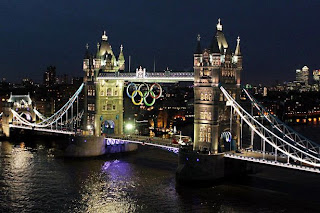London 2012 Olympics Opening Ceremony
Even though it's been three days, I'm still blown away by the Olympic Opening Ceremony. The director, Danny Boyle, left no doubt as to his talent and artistic genius. I've seen some of his films and I was able to see a broadcast of the play, Frankenstein, he directed in 2011. The opening ceremony had his artistic stamp all over it. The "set" was incredible, with a lush agrarian landscape that changed before our eyes to industrial England. As the set changed, so did the characters and performances, reflecting the incredible history of England during those years since the Industrial Revolution.
My favorite moments were the lovely children's choirs from the Home Isles, Kenneth Branagh reciting Shakespeare, the forging of the Olympic rings from a molten river than imitated the path of the Thames, the internet homage to British pop music, and the unique caldron lighting with copper petals from each country. I would agree with Boyle when he was asked to name his favorite moment that he was very moved by the construction workers who built the stadium as they formed an honor guard for the last leg of the torch's journey into the stadium. Oh, and I couldn't help but like the army of Mary Poppinses (Danny Boyle is the man who made the world ask, "What is the plural form of Mary Poppins?) who vanquished the nightmares from the children's sleep. And of course, the Queen with James Bond and Mr. Bean: classic, and dare I say, epic?!
England, as in the rest of Europe, saw the physical scars of war on their land, especially during the Second World War. The scars mirrored the emotional, spiritual, and physical ones of their returning troops. Their world was turned upon its head and nothing would ever--could never--be the same as before. It's not surprising that we see a huge change in art, literature and politics in Europe after the First World War. After WWII, our country expanded the suburbs, bought new cars and appliances, while England was left economically depressed and physically scarred as she faced re-building, with her energy so depleted from the long fight that was the war. As Americans, we can sometimes look at things narrowly, without taking into account the difference of experience that shaped Europe in the twentieth century, compared with our own experience.
When I was in England for the second time, the trip was very much a pilgrimage for me. In addition to churches and cathedrals, my favorite place to visit was the WWI exhibit in the Tate Modern. It was sacrosanct for me as I saw before me the artistic portrayals which attempted to capture the loss, horror, turmoil, faith, despair, and hope of those who were a part of the Great War. I could only stand and ponder, then pray, making a feeble attempt to understand and empathize.
I had similar feelings as I watched Danny Boyle's Olympic production. It was heart and soul, pastoral and calm, industrial and scarred. It was a brave, tough people always keeping on and moving ahead, as best they can, still with triumphs and spirit. It truly brought me to tears as I felt that I was privileged to witness it before me on screen.
Even for those who didn't enjoy the artistry, though, there was something to enjoy with the parade of nations and the grande finale. I thought of the movie Amadeus. Boyle remedied what Salieri saw as Mozart's neglect. Along with sign and symbol, he gave the audience a big bang at the end so they knew when to clap.




Comments
Post a Comment
Your comments are welcome!